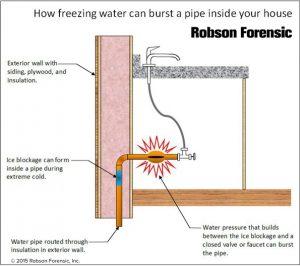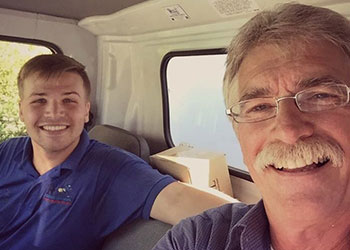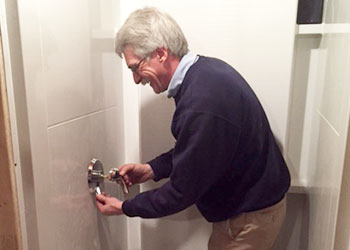Here comes winter
Autumn has been mild so far in Marlborough CT. But we all know how New England weather is. We start the day off in shorts, then need a parka by the end of the day. It's time to think about prepping your home for winter. One of the most common repairs your local plumber does is burst pipe repair. We have some tips on how to prevent frozen and burst pipes.What causes a burst pipe?
Before we continue, let's take a moment to understand how a burst pipe happens. When water inside a heating or plumbing lines gets too cold, it will freeze. When water freezes, it expands. The pipe can NOT expand, so it will crack. For example, think about putting a soda can in the freezer. Once the liquid freezes, it will burst and create a mess.If the pipes in your home are very old, you may wind up with several bursts. Once the water starts to thaw, it will drip into your basement, walls, or ceilings. Water damage restoration is extremely costly, so we have a few tips to prevent this mess.

Check your basement
An older home tends to have a lot of drafty areas. Locate your home's heating pipes. Feel around for any spots that cold winds can get through and seal them up. Check windows, bulkheads, and look for any cracks in the foundation. It's not usually the frigid temps that freeze a pipe, but the freezing winds that blow on them.A newer Marlborough CT home often has a finished basement. There can still be spots where cold winds can be a problem. A burst pipe in a family room can put a devastating dent in your wallet, right before the holidays. From the plumbing repair, to replacing the carpet, furniture, and/or sheetrock, it all adds up quickly. Please take some time to seal up your basement area.

Listen to the weather
When the forecast calls for a sudden dip in temperatures, subzero windchills, and drifting snowfall, it's time to be proactive. Do you look out a window when you wash dishes? That means your plumbing pipes could be exposed to the cold temps. Open up your cupboards to let warm air circulate around the plumbing to prevent a burst pipe.Avoid turning down your heat too much, or closing doors to rooms you don't use often. It's tempting to save on energy costs, but any savings you could have achieved will be eaten up by an emergency plumbing repair bills. A thermostat set to at least 68°F allow you to conserve energy AND help prevent a frozen and burst pipe.
























